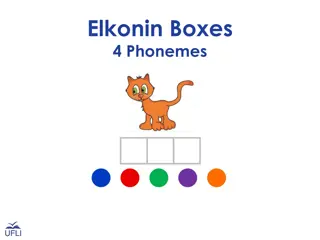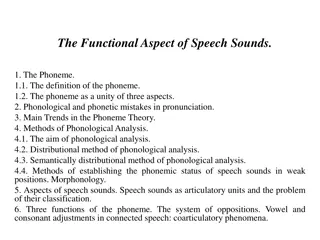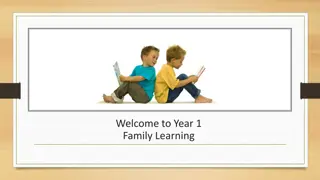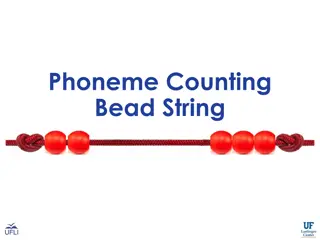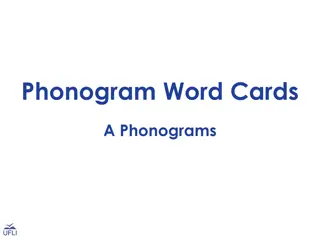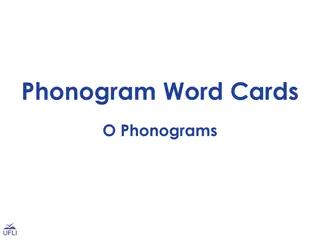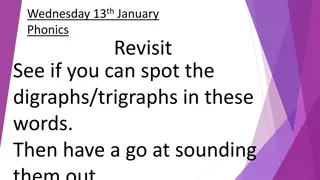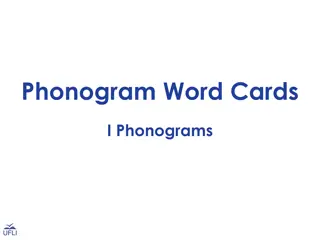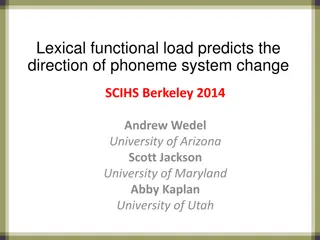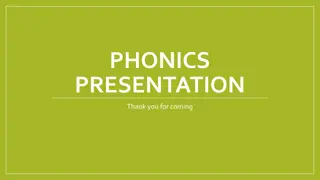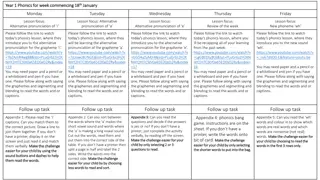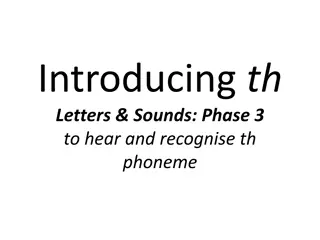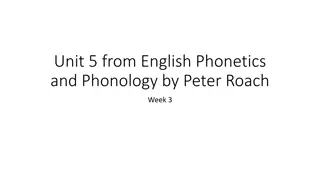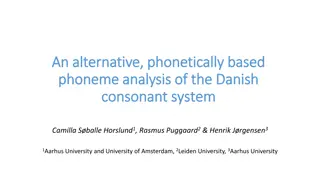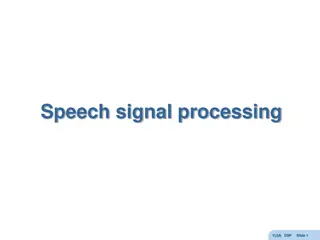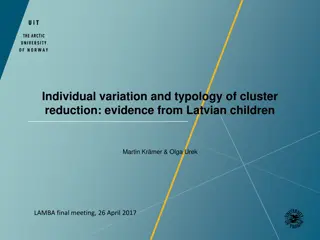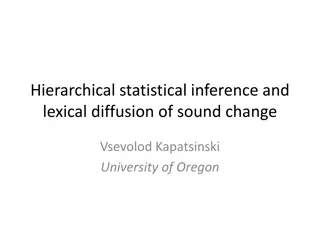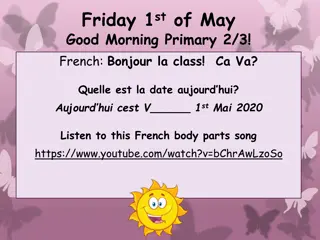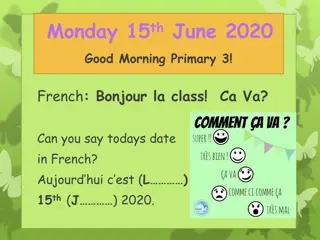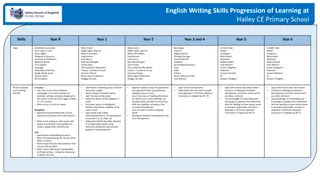Phonemic Awareness Practice with Elkonin Boxes
Engage students in a phonemic awareness activity using Elkonin Boxes to help them identify and manipulate the sounds in words. This interactive lesson involves counting sounds, uncovering boxes, and moving chips to represent each phoneme. Share screens and guide students through the process for effe
0 views • 14 slides
Understanding the Functional Aspect of Speech Sounds
The functional aspect of speech sounds delves into the concept of phonemes, phonological and phonetic mistakes in pronunciation, main trends in the phoneme theory, and methods of phonological analysis. It explores the definition of phonemes, the three aspects of phonemes, and the different views on
0 views • 30 slides
Explore Sounds Write Phonics Program in Year 1 Classroom
The Sounds Write phonics program in a Year 1 classroom focuses on teaching essential reading and writing skills like segmenting, blending, and phoneme manipulation. Through engaging learning experiences and daily practice, students develop fluency in reading and writing. The program includes activit
0 views • 17 slides
Phoneme Counting Bead String Activity
Engage students in segmenting and counting phonemes in words using a model with beads. Guide students to move a bead for each sound they hear, promoting phonemic awareness. Students can control the movement themselves if able, enhancing remote learning experiences.
0 views • 8 slides
Phonogram Word Cards Collection for Phoneme-Grapheme Correspondences
Explore this collection of phonogram word cards designed for teaching new phoneme-grapheme correspondences and engaging review activities such as word sorts. Each set includes words with the same phonogram to aid in language learning and literacy development.
0 views • 53 slides
Phonogram Word Cards for Teaching Phoneme-Grapheme Correspondences
These phonogram word cards provide lists of words with the same phonogram, such as -oat, -oak, -ob, -ock, -od, -og, -oil, -oke, -old, -ole, -oll, -one, -ood. They are useful for teaching new phoneme-grapheme correspondences, review games, and other activities that require lists of words with similar
0 views • 34 slides
Wednesday 13th January Phonics Revisit: Digraphs and Tricky Words Practice
Explore digraphs and tricky words in phonics practice - spot and sound out digraphs/trigraphs, decode upside down words, learn new sounds like "ir," and practice phoneme spotting. Engage in memory tests and find mistakes to enhance phonics skills.
0 views • 12 slides
Phonogram Word Cards for Phoneme-Grapheme Correspondences
Explore lists of words with the same phonograms to teach new phoneme-grapheme correspondences, ideal for review games like Word Sorts and other activities requiring phonogram-based word lists. Enhance reading and spelling skills through engaging practices with word groups like nice, price, rice, sli
0 views • 26 slides
Phonogram Word Cards for Teaching Phoneme-Grapheme Correspondences
Phonogram Word Cards include lists of words with the same phonogram, such as -ub, -uck, -ud, -udge, -ue, -uff, -ug, -um, -ump, -un, -unch, and -ung. These cards can be used in teaching new phoneme-grapheme correspondences, review games, and various literacy activities. Each set of words focuses on a
0 views • 19 slides
Phonogram Word Cards for Teaching Phoneme-Grapheme Correspondences
Explore a collection of phonogram word cards featuring various phoneme-grapheme correspondences for educational activities like word sorts and review games. Enhance phonics skills with word lists containing words sharing the same phonogram, covering a wide range of graphemes and phonemes. Utilize th
0 views • 32 slides
The Influence of Lexical Functional Load on Phoneme System Changes
The study explores how the functional load of phoneme contrasts affects the trajectory of phoneme system changes over time. Researchers examine phoneme mergers in nine languages, finding an inverse correlation between the number of minimal pairs and mergers. The model is refined to investigate diffe
2 views • 26 slides
Effective Phonics Teaching Strategies for Year One Children
Explore the structured phonics teaching programme aiming to meet Year One standards, emphasizing the importance of phonics for reading and writing skills development. Engage with daily interactive activities, games, and partner work sessions for 20 minutes each day. Learn key definitions such as gra
0 views • 14 slides
Year 1 Phonics for Week Commencing 18th January
In this week's Year 1 phonics lessons, students will focus on the alternative pronunciation of 'a', 'i', and 'e', as well as learn a new phoneme 'wh'. They will engage in activities like watching educational videos, word sorting, answering yes or no questions, matching captions to pictures, and diff
0 views • 8 slides
Exploring Phase 3 Letters and Sounds: Recognizing the 'th' Phoneme
Dive into Phase 3 of Letters and Sounds where children learn to hear and recognize the 'th' phoneme through words like bath, cloth, moth, and more. Engaging images aid in understanding and practicing these important sounds. Can you think of any more 'th' words to add to the list?
0 views • 18 slides
Understanding Phonemes and Phonology in English
Exploring the concept of phonemes and phonology in English phonetics, this text discusses how sounds are produced, segmented, and categorized. It delves into the abstract string of sound units known as phonemes, different realizations of the same phoneme called allophones, and the use of symbols and
0 views • 7 slides
An Alternative Phonetically-Based Phoneme Analysis of the Danish Consonant System
This study challenges the standard analysis of the Danish consonant system, proposing a new phonetically-based approach. It critiques the outdated standard analysis that links unaspirated plosives with semivowels, arguing that the alternative analysis is more in line with phonetic facts and easier t
0 views • 19 slides
Understanding Speech Signal Processing and Phonemes
Delve into the world of speech signal processing, exploring applications like speech storage, recognition, and synthesis. Discover how different languages utilize phonemes to convey meaning through various acoustic units. Uncover the intricacies of speech sampling and phoneme types, from vowels to c
0 views • 73 slides
Evidence of Cluster Reduction in Latvian Children
Investigation explores errors in L1 acquisition of complex word-initial onsets in Latvian children, examining the role of sonority, constraints on complex onsets, and factorial typology of OT constraints. Data from the LAMBA phoneme test with 20 Latvian-speaking children highlights various cluster t
0 views • 18 slides
Understanding Sound Change: Hierarchical Statistical Inference and Lexical Diffusion
Explore the dynamics of sound change in Usage-based Phonology, analyzing articulatorily-motivated and analogical changes. Discover how reduction in word usage influences phoneme evolution and learn about predicting reduction probabilities through a learning problem perspective. Dive into the standar
0 views • 20 slides
Primary 2/3 Online Learning Recap - May 1st
In this online learning session for Primary 2/3 students, the day starts with a cheerful French greeting and date identification. A variety of activities are then outlined, including literacy tasks, phoneme word exploration, free writing, mathematics challenges, and a topic exploration on designing
0 views • 8 slides
Primary 3 Daily Learning Activities - June 15th, 2020
Today's learning tasks for Primary 3 include French greetings, literacy activities focusing on the 't' phoneme, revision of stage 3 sounds, reading practice, a story session, mathematics number talk on estimation and dice counting, as well as numeracy activities for developing addition and subtracti
0 views • 12 slides
English Writing Skills Progression at Hailey CE Primary School
Learn about the progression of English writing skills at Hailey CE Primary School, covering different topics and skills from Reception to Year 6. Students develop phonetic and whole-word spelling abilities, progressing from basic letter recognition to more complex words and homophones. The curriculu
0 views • 5 slides
